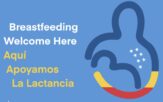We are recognizing and promoting medical offices that have made breastfeeding support a priority. Programs that receive this designation will receive a certificate, a “Breastfeeding Welcome Here” window cling, and will be listed on our website. Health care within the Durham community must be breastfeeding friendly if the Durham community is to support breast/chestfeeding. Research confirms that comprehensive breast/chestfeeding support in prenatal, maternity, and postnatal care results in improved breast/chestfeeding success.
Suggested Approaches:
Review the Making Breastfeeding Work for Medical Offices (PDF) is a six-point toolkit to guide medical offices in developing policies and practices for optimal breastfeeding support. The recommendations are aligned with the American Academy of Pediatrics, the Academy of Breastfeeding Medicine, and the World Health Organization. This program was developed by Boulder County Public Health for use statewide. Next, begin drafting an office lactation policy. Clear policies and procedures are an essential part of supporting lactating families. A lactation policy not only ensures compliance with laws and regulations, it also gives guidance for decision-making, trauma informed care, and patient centered care.
Review Additional Resources
- Review the recommendations from the Academy of Breastfeeding Medicine for a Breastfeeding-Friendly Physician’s Office
- Medical Office Breastfeeding Self-Assessment (PDF) tool to measure your office’s practices around breastfeeding (Sample policy on page 21-23)
- The Breastfeeding Friendly Pediatric Office (PDF)
- Mother’s Milk Bank Information for Provider
- Academy of Breastfeeding Medicine Protocols
- Academy of Breastfeeding Medicine Clinical Protocol #2: Guidelines for Birth Hospitalization Discharge of Breastfeeding Dyads, Revised 2022
- ABM Clinical Protocol #14: Breastfeeding-Friendly Physician’s Office—Optimizing Care for Infants and Children
- ABM Clinical Protocol #33: Lactation Care for Lesbian, Gay, Bisexual, Transgender, Queer, Questioning, Plus Patients
- The Historical, Psychosocial, and Cultural Context of Breastfeeding in the African American Community
- Breastfeeding, Family Physicians Supporting (Position Paper) | AAFP
Recommended Trainings
- Breastfeeding University – Four free training modules
- University at Albany – Four free training modules
- Writing a Medical Office Sample Lactation Policy
Support the Community
- Come to a Breastfeed Durham meeting or email us if you need support
- Collaborate with local WIC, breastfeeding organizations (Breastfeed Durham, La Leche League, etc.), and/or health care organizations to make available breastfeeding materials and trainings.
- advocate that hospitals and birth centers seek the Baby-Friendly Hospital designation.
- Give special attention to meeting the needs of various racial/ethnic groups.
- Continue to provide encouragement and support to other healthcare providers.
- Support families with breastfeeding education.
- Discourage the promotion of commercial infant or related toddler formula through ads or free samples and, when supplementation is medically-indicated
- Make every effort to provide expressed milk from parent or donor human milk before infant formula.
Practices for all Health Service Providers
- Breastfeeding families are always welcome and respected. They will never be treated poorly, asked to stop breastfeeding, or asked to cover up or move.
- Do not promote or provide infant formula (including toddler formula), coupons, or related products unless medically indicated. Do not accept gifts of infant feeding products from manufacturers nor display infant feeding products.
- Have a breastfeeding policy. The policy should include sections for the patients, providers, and staff education; advice/telephone triage with a response time within 4 hours; and dispensing formula.
- Allow all lactating employees breaks to express milk or nurse their children and access to a private space for expressing milk or nursing. Space is not a bathroom; is lockable and shielded from view; includes an electrical outlet, and has hand hygiene available.
- Adhere to the breastfeeding practice advice of the breastfeeding expert opinions of our respective professional associations/colleges and/or the Academy of Breastfeeding Medicine.
Additional Practices for Obstetrics, Pediatrics, Family Medicine, and Med-Peds
- Take at least 3 hours of clinical breastfeeding support training.
- Have an IBCLC on staff and/or actively refer all prenatal and postpartum women to skilled providers.
- Actively ensure that all prenatal patients receive interactive education on breastfeeding, as well as local support groups/healthcare information.
Please contact us with any feedback or questions.
